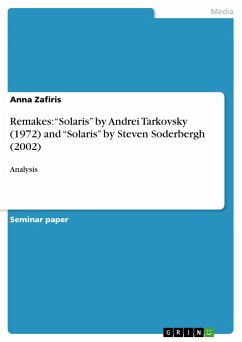Seminar paper from the year 2004 in the subject Communications - Movies and Television, grade: 1, Utrecht University (Media Studies), course: Remakes & Parody, language: English, abstract: Thom Patterson from CNN expresses the issue of the remake in a very nice way: "Remaking well-known films can be the Hollywood equivalent of replacing the family dog or a favourite bathrobe: sometimes only the old one will do and a replacement is unthinkable."In my case study I will take a closer look at the two different versions of"Solaris":Andrei Tarkovsky's "Solaris" (1972) andSteven Soderbergh's "Solaris" (2002)Is Soderbergh's "Solaris" a worthy representative, replacement or addition to Tarkovsky's "Solaris" or is it just like Patterson describes it, unneeded like the replacement of the family dog? Is Tarkovsky's "family dog" so well-known and respected that a new "family dog" would be redundant?First of all, one should notice that both films are based on Stanislaw Lem's book "Solaris". Atleast that's what one can read everywhere...but is this so? Is Soderbergh's film a re-adaptation of Lem's book or is it rather a remake of Tarkovsky's film?I would like to analyse in what way the two directors developed the characters in the film having the book "Solaris" as the basis.By analysing the way, Soderbergh and Tarkovsky present the relationship between Hari/Rheya and Chris and how the two directors develop the characters, I will also try to find an answer to the question whether Soderbergh's "Solaris" is a remake of Tarkovsky's Solaris or a re-adaptation of Lem's book.What are the similarities and differences of the presentation of this relationship in the two films?Soderbergh for example never personally said that his film is only a remake of Tarkovsky's "Solaris" but also, or even more, a re-adaptation of Lem's book.This would exactly apply to the theory of Jan Speckenbach, who mentions in his first part of "On the Remake. A cinematic phenomenon" that sometimes the director of a remake denies it to be one. Since it might sell better when it is a new adaptation of the novel - that also is used in the original film - that provided a basis for the remake and not just a remake of the original film. But did Soderbergh only refer to his film as a re-adaptation because it might sell better or is it really a re-adaptation?Hari/Rheya (named Hari in Tarkovsky's "Solaris", differently in Soderbergh's "Solaris" and same as in Lem's book: Rheya) also plays a central role in the two films, and I would like to analyse the representation of her in the two films.
Bitte wählen Sie Ihr Anliegen aus.
Rechnungen
Retourenschein anfordern
Bestellstatus
Storno








